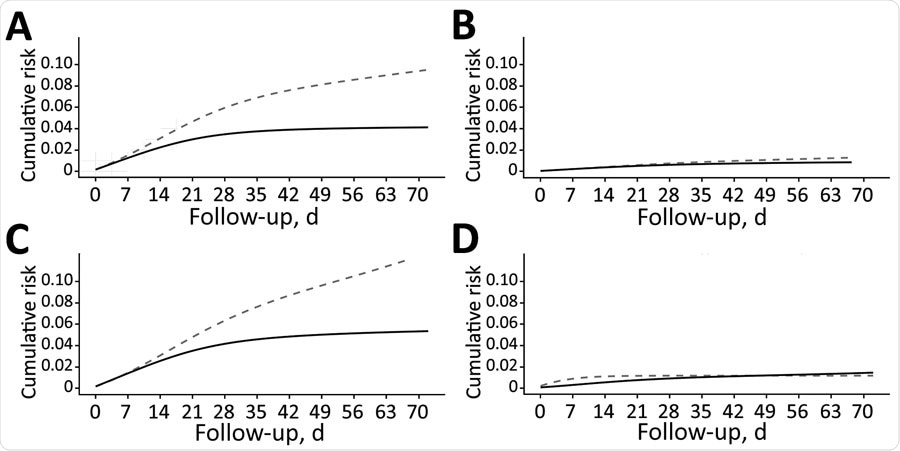Older adults living in nursing homes and long-term care facilities are at high risk of becoming infected and spreading severe acute respiratory syndrome coronavirus 2 (SARS-CoV-2) to other residents. They are also at a higher risk of developing severe infections and dying from the virus. In Spain, the mortality rate was 67 per every 1,000 residents.
The study by researchers from the Ministry of Health, Madrid, Spain, published in the Center of Disease Control and Prevention’s journal Emerging Infectious Diseases, suggests that long-term care facility residents with prior SARS-CoV-2 infection benefit from full vaccination with the Pfizer/BioNTech (BNT162b2) vaccine. In clinical trials, the Pfizer vaccine elicited a 95% efficacy in preventing COVID-19 illness. But how the vaccine affects elderly residents remains poorly understood since the trials had low enrollment from this population.
The results showed the vaccine was 56.8% effective in residents with a history of COVID-19. Vaccinated residents with no prior SARS-CoV-2 exposure were protected against the virus by up to 81.8%. Non-vaccinated residents with no history of COVID-19 also appeared to indirectly benefit from the vaccines because they reduced transmissibility in the facility.
The researchers write:
“Our findings endorse the policy of universal vaccination in this setting, including in persons with previous infection, and suggest that non-vaccinated persons benefit from indirect protection.”
How they did it
The researchers gathered data on almost all residents 65 years or older in long-term care facilities in Spain using a nationwide registry of all vaccine doses given or rejected. They included residents who received their first dose from December 27, 2020, to March 10, 2021.
About 99% of residents received one or more vaccine doses, with 99.8% of doses coming from the Pfizer/BioNTech vaccine. About 92.6% had a second dose within a median of 21 days. Approximately 1% of residents were unvaccinated.
Residents who were positive for SARS-CoV-2 again with 60 days of receiving a positive test result were excluded from the study. The researchers justified the exclusion because they are more likely to be the cause of prolonged PCR positivity than reinfection.
The data included COVID-19 tests for symptomatic and asymptomatic infections as residents underwent regular testing and periodic screenings.
About 12.7% of vaccinated residents and 27.7% of unvaccinated residents had previously recovered from a COVID-19 infection.

Cumulative incidence of documented severe acute respiratory syndrome coronavirus 2 infection in long-term care facilities estimated from adjusted hazards models, Spain, December 27, 2020–March 10, 2021. A) Standardized risk in the vaccinated with no previous infection and its reference group; B) standardized risk in the vaccinated with previous infection and its reference group; C) standardized risk in nonvaccinated (indirectly protected) with no previous infection and its reference group; D) standardized risk in nonvaccinated (indirectly protected) with previous infection and its reference group. Solid lines indicate study group; dotted lines indicate reference group.
Vaccine effectiveness in vaccinated and unvaccinated with no history of SARS-CoV-2
Vaccinated residents with no prior COVID-19 infection were protected against the virus by up to 57.6% with one dose. Full vaccination increased effectiveness to 81.8%.
“The estimated number of SARS-CoV-2 infections averted by vaccination (RD) was greatest in the intermediate periods, which coincided with the peak of the epidemic waves at 11.6 cases/10,000 vaccinated persons per day,” wrote the team.
Non-vaccinated residents with no prior COVID-19 infection had indirect protection against the virus by up to 58.7%. The risk of getting COVID-19 infection increased progressively after 29 days, which coincides with the timeline of vaccinated residents becoming fully vaccinated. The researchers found the number of SARS-CoV-2 infections averted in unvaccinated residents was similar to vaccinated residents.
Vaccine effectiveness in vaccinated residents with a history of SARS-CoV-2
Vaccinated residents who recovered from a previous COVID-19 infection had lower vaccine effectiveness than those who were vaccinated and had never been exposed to SARS-CoV-2. Their vaccine effectiveness was 36.3% with one dose and 56.8% with two doses.
Indirect protection in unvaccinated residents with a history of infection could not be measured because this was too small of a group to analyze.
Study limitations
Relaxing isolation guidelines during the Christmas season and allowing for more visitations may have contributed to a higher number of cases, affecting the results.
Their results only included residents who recovered from previous infection and lived long enough to become vaccinated. Before the study began, a second wave occurred, resulting in reinfections and deaths. “Therefore, the group with previous infection in the study period had more recent infections compared with the group in the reference period; if this factor conferred greater protection, it could overestimate VE in this group,” explained the researchers.
People who recovered or are in the process of recovering from COVID-19 illness may continue to exhibit viral shedding for more than 60 days. The researchers could not exclude the possibility that prolonged viral shedding could be misinterpreted as a new infection, decreasing vaccine effectiveness in the analysis.
Journal reference:
- Monge S, et al. Direct and Indirect Effectiveness of mRNA Vaccination against Severe Acute Respiratory Syndrome Coronavirus 2 in Long-Term Care Facilities, Spain. Emerging Infectious Diseases, 2021. doi: 10.3201/eid2710.211184, https://wwwnc.cdc.gov/eid/article/27/10/21-1184_article